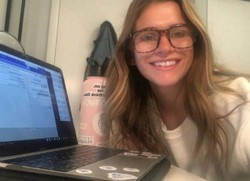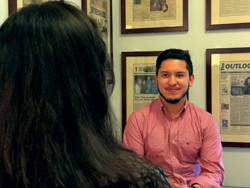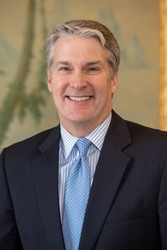From 6 p.m. to 6 a.m. on Election Day, Payton Collander sat in front of her computer, working for the Associated Press as a Vote Entry Operator. She counted votes for all races in four of the New England states— Vermont, New Hampshire, Maine, and Massachusetts.
Collander, a senior double majoring in criminal justice and political science, explained the process of vote counting, “We logged into the Associated Press database, which was filled with safety precautions. You would either get a call or a fax from clerks or stringers, the people that are at the polls. We did all the votes by county. By the end of the day, you were counting a couple hundred thousand votes.”
“I ended up pulling an all-nighter, but it didn’t even feel like it,” she continued. “There was so much adrenaline. It’s a pretty tedious task, but it went by pretty fast.”
The Associated Press has counted votes and called races in all 50 states for over 170 years, according to the global news organization’s website.
“I was nervous because you are doing a big thing; you’re a part of something a lot bigger than yourself,” Collander said. “However, it was also really cool because this is something that I’m going to be able to talk about for years to say that I was part of probably one of the most divisive election that I’ve had in my lifetime, and probably my parents’ lifetime as well…It ended up being one of the best experiences I’ve had in 2020 so far.”
Collander said that she considered the position an internship, because the training period lasted about two months, where she was trained on safety precautions to prevent fraud and miscounting.
This past summer, she also completed a virtual internship at the company Selective Insurance as a part of their agency development department, which she will return to over winter break.
She said, “I got to see a lot of that contract work that they were doing between agents, and I got a lot of access to resources in terms of the legal department and the claims department, which is very law heavy because the insurance industry is so regulated. In any department there’s some legal facet, so I just happened to go to agency development. That kind of gave me the platform to understand how that type of law works and how contract law works.”
Collander also competes on the University’s debate team and serves as captain for the Model United Nations team. Ken Mitchell Ph.D., Chair of the Political Science Department and Advisor for the Model UN club, described Collander as a fantastic student.
“Encouraging students to see themselves as potential leaders and mentors on campus is a priority of the Political Science and Sociology Department. It’s part of our strategy to build an effective academic culture in our department. Payton embraces this challenge,” he said. “Besides her individual accomplishments at Model UN contests (there have been many) I am especially pleased with her leadership energy and skills for the impact she has on other students.”
He continued, “Last year (2019-2020), Payton as Captain lead by example (hard work, tireless preparation, relentless effort at contests, etc.) and as a mentor, guiding a large group of first-year students and expanding the pool of successful, competitive Model UN students at MU. Our Model UN program has never been stronger, thanks in large part to the efforts of Payton.”
Collander said that while counting votes was a big commitment, it wasn’t too overbearing that it interfered with schoolwork or extracurriculars such as Model UN and the debate team.
She said, “I would definitely do it again depending on where I am in my career. It does require a decent amount of your time. If I were to do the next election, I would probably go to the swing states because I would be considered ‘experienced,’ but there’s still a lot of pressure because you don’t want to mess up.”
After graduation, Collander plans to take a gap year before applying to law schools in New York such as Columbia, NYU, Cornell, and Fordham
Collander said that she chose to major in both criminal justice and political science because of the many different avenues it can take students. “You can be a researcher or a poll counter, or you can go into law because it provides a great foundation for that especially if you do a concentration in legal studies,” she explained.
“Criminal justice has always been a contentious issue in our country, especially right now, so I wanted to learn how that process works,” she continued. “Eventually I want to make an impact on this world, and I felt that those two majors combined prepared me most and gave me the best chances to eventually make that impact that I want to have.”
PHOTO COURTESY of Payton Collander




